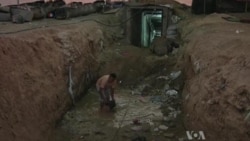RAFAH, GAZA STRIP —
The economy of the Hamas-ruled Gaza Strip is reeling since Egypt destroyed hundreds of smuggling tunnels that it says were being used by Palestinian militants to stage attacks in the Sinai Peninsula. The destruction of the tunnels has wiped out thousands of jobs in Gaza.
Abu Wasseem looks older than his 25 years. He has been working in Gaza’s smuggling tunnels since he was 19.
The Egyptian government last month destroyed most of the tunnels, putting Wasseem and thousands of others out of work.
"Life is difficult, and becoming more and more difficult because each tunnel supported many houses [families], not just one. Any tunnel worker will tell you the situation is very bad," he said.
The tunnels were a lifeline to Gaza, which has been under an Israeli blockade for six years. Their closure has caused shortages of many goods. And prices have jumped because everything now must come through Israel, which is more expensive than Egypt.
Work in the tunnels is hard, and it is dangerous. Wasseem has lost several friends because of cave-ins.
"Even now there are deaths in the tunnels and cases of paralysis and other injuries. My own body is covered with scars. The whole tunnel business is soaked with blood," he said.
Wasseem said one solution would be for Egypt to allow trade through Rafah Crossing. This does not appear likely, however, under the new government in Cairo. He said the tunnel business is almost finished. But he is building a new tunnel because it is all he knows.
Abu Wasseem looks older than his 25 years. He has been working in Gaza’s smuggling tunnels since he was 19.
The Egyptian government last month destroyed most of the tunnels, putting Wasseem and thousands of others out of work.
"Life is difficult, and becoming more and more difficult because each tunnel supported many houses [families], not just one. Any tunnel worker will tell you the situation is very bad," he said.
The tunnels were a lifeline to Gaza, which has been under an Israeli blockade for six years. Their closure has caused shortages of many goods. And prices have jumped because everything now must come through Israel, which is more expensive than Egypt.
Work in the tunnels is hard, and it is dangerous. Wasseem has lost several friends because of cave-ins.
"Even now there are deaths in the tunnels and cases of paralysis and other injuries. My own body is covered with scars. The whole tunnel business is soaked with blood," he said.
Wasseem said one solution would be for Egypt to allow trade through Rafah Crossing. This does not appear likely, however, under the new government in Cairo. He said the tunnel business is almost finished. But he is building a new tunnel because it is all he knows.





